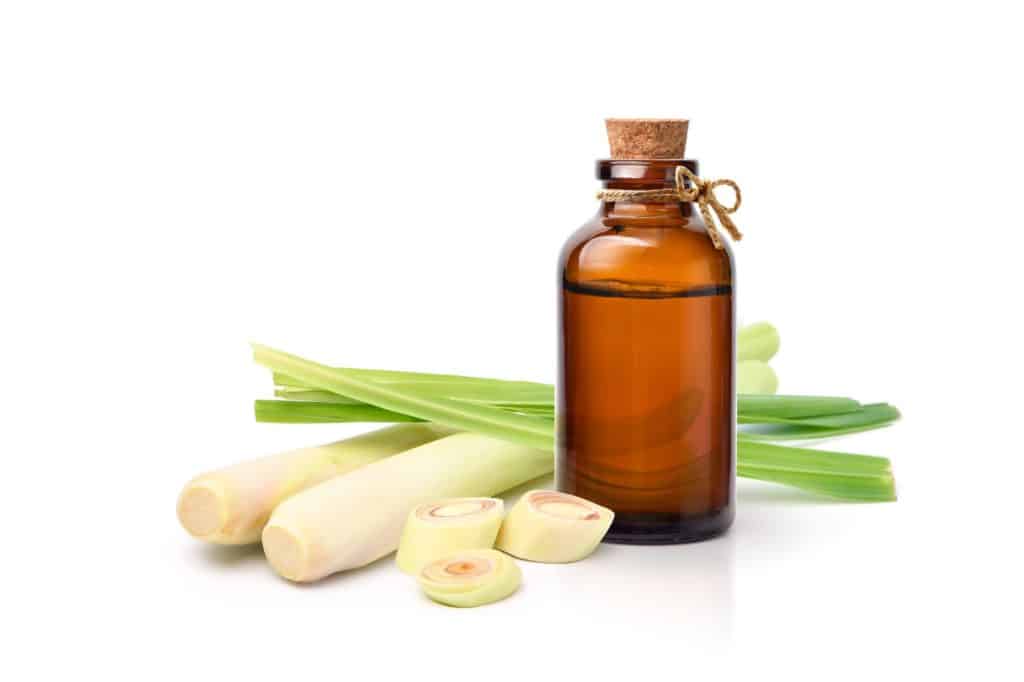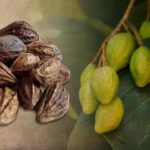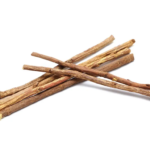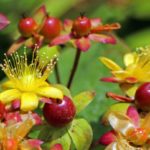
Angelika Klotz
(Holistic therapist)
Note — The article was checked and updated April 2023.
Lemongrass essential oil has powerful antibacterial and antiseptic properties. Native to Asia and Africa, lemongrass is used in massage, steam inhalation and diffusing due to its anti-inflammatory and antioxidant effect.
Today we will share more details on traditional and therapeutic uses, as well as different aromatherapy blends.
Introduction
Lemongrass (Cymbopogon citratus) is one of nature’s “liquid-sunshine-in-a-bottle” essential oils.
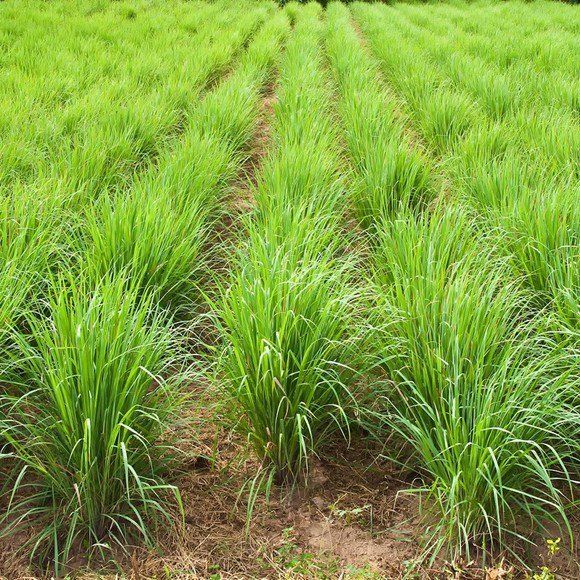
Lemongrass is a steam distilled from a tall, perennial native grass that can grow to a height of 1.5 meters. We can find lemongrass in tropical Asia, India, Sri Lanka, Indonesia, the West Indies and Africa.
When distilled, the yellow, amber or reddish-brown liquid has a fresh, grassy-citrus scent with an earthy undertone.
This lemony and pungent clean fragrance makes the oil refreshing, stimulating yet soothing. Some people find the aroma relaxing while others regard it as a wake-up essence.[1]
Traditional uses
Lemongrass (as a plant) is a favorite in Asian cuisine, giving culinary creations a refreshing taste which stimulates the digestive system.
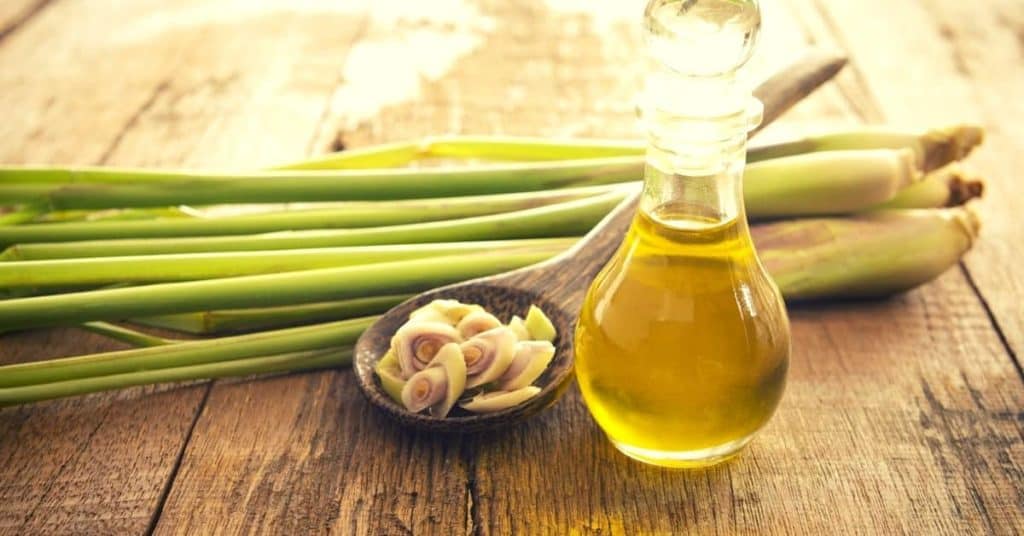
As an essential oil, lemongrass helps to ward off mosquitoes and to soothe sandfly bites. To keep the sandflies away, I suggest blending lemongrass into aloe vera.
Lemongrass is a strong antimicrobial and antiseptic essential oil
In addition, lemongrass is a psychologically balancing oil that supports us in this time of pandemic, fear and anxiety.[1,2]
Therapeutic uses
The cooling action of lemongrass can reduce fever once we have been struck down with cold and flu symptoms. The great news is that it also stimulates the immune system at the same time.[3]
The essential oil of lemongrass has uplifting properties that can assist with
- Depression
- Melancholy
- Sadness
Since we are still in summer, another issue that can arise during the hot weather are inflamed little pimples that appear on the inside of the upper thigh. These can merge to form a scaly, red and itchy patch.
I suggest adding 8-10 drops of lemongrass to your bathwater as a disinfectant measure on a regular basis and these will clear.
Men can also have issues with fungal infections, such as tinea cruris, and can follow the same advice as above. Additional treatments with an ointment that contains lemongrass, tea tree and lavender can also be used for healing and preventative measures.[4]
The same application can be used for
- ringworm
- tinea capitis[4]
For some, dandruff can be a problem. Dandruff are small dry flakes of dead skin that are released into the hair from the scalp.
How to use
Some of the lesser known applications of lemongrass essential oil are:
Nail polish remover
Can be used as nail polish remover which is healthy for the nails since the acetone in normal nail polish removers takes away the top layers of the nail, leaving it more vulnerable. Remove nail polish with a few drops of undissolved lemongrass essential oil on a cotton ball.
Supports lactation
Lemongrass enhances the milk flow in mothers who have insufficient milk supply when nursing a baby.[3]
Use a warm lemongrass essential oil compress between feeding to enhance the milk production. Additional diffusion of lemongrass oil can support this further.
Supports lymphatic system
Lemongrass essential oil stimulates hydration and lymphatic detoxification of weak connective tissue. Together with its tightening action on elastin weakness makes lemongrass a great cellulite toner. It can be used together (blended into) with grapeseed and rosehip oil.
Supports mood and focus
Lemongrass can also uplift and assist with lack of concentration and morning fatigue.
Supports liver
After many indulging holiday celebrations, the stimulating effects of lemongrass on the liver can help to clear the burdens of alcohol and sugar from our biggest and most active detoxing organ.[5]
Aromatic Kinesiology framework uses lemongrass to move from being restricted to being able to expand.
“Lemongrass enables the mind to shift towards fascination about what is possible, encouraging you to embark on a glorious voyage of discovery.”
Essential oil dilution guidelines
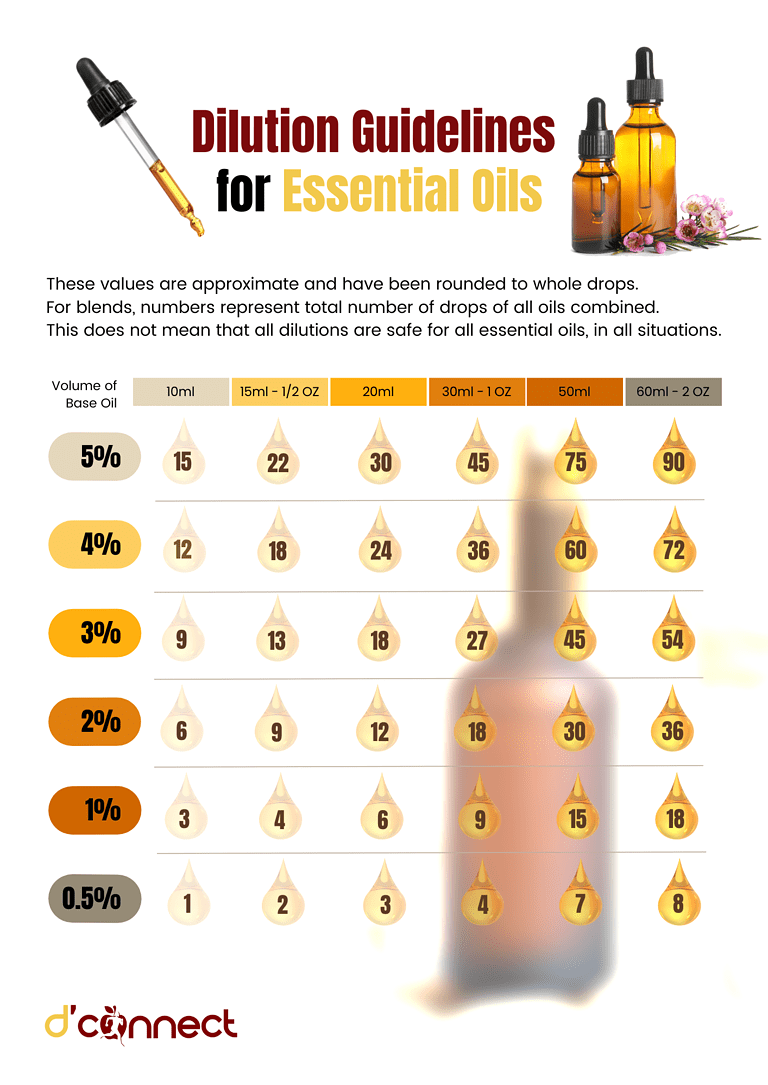
“Lemongrass enables the mind to shift towards fascination about what is possible, encouraging you to embark on a glorious voyage of discovery.”
The affirmation that can be used here is “If it’s possible in the world, it’s possible for me.” This is rather reassuring with 2022 just being ushered in.[6]
Aromatherapy blends
Lemongrass is highly odoriferous and should therefore be used only sparingly.
It is advised to always dilute lemongrass essential oil to 0.5% in a carrier substance, like almond oil, jojoba or aloe vera.[4]
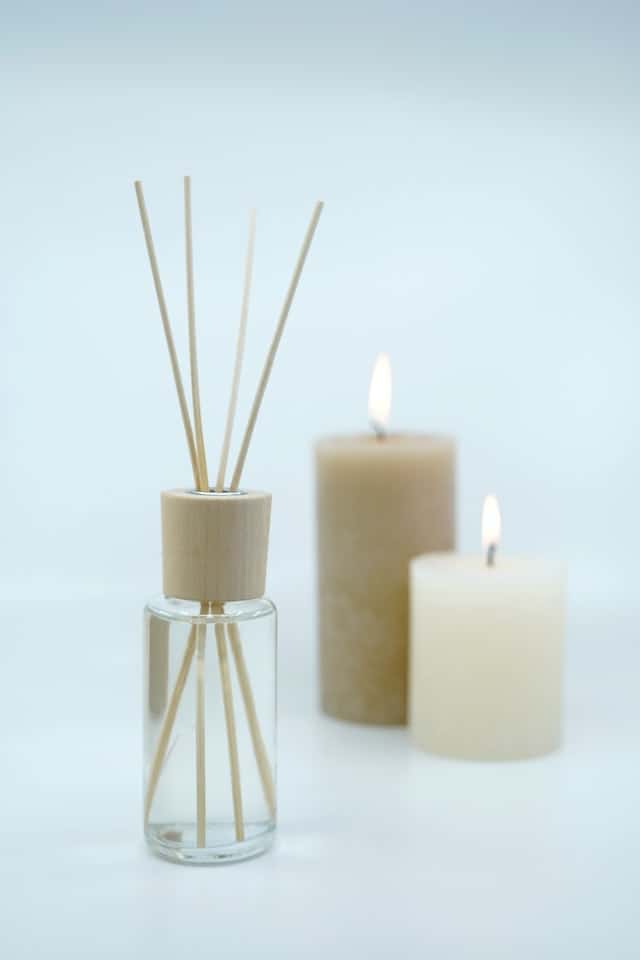
Stress supporting blend
The uplifting properties of lemongrass have balancing effects on emotions and the ability to restore vitality during periods of prolonged stress, especially when blended with mandarin and neroli in a diffuser.
- 1 drop of lemongrass
- 1 drop of neroli
- 2 drops of mandarin essential oil
Insect repellent blend
Used as an insect repellent, lemongrass blends well with lavender and tea tree.
- 5 drops of lavender
- 3 drops of tea tree
- 2 drops of lemongrass
- 50 ml carrier substance
Apply generously.
Precaution and Safety
Lemongrass should be avoided on sensitive, damaged or sunburned skin or when you are prone to allergies.[7]
May the sunshine effect of lemongrass support your health in 2022.
Angelika has been supporting clients, friends and family members on their journey to health and wellbeing for more than 30 years through healing sessions, education and wellness retreats. After being interested in holistic health care all her life and studying with various Masters in their field in Asia, Germany and Australia, Angelika settled in Auckland 15 years ago where she offers holistic treatments from her studio in Mission Bay.
Her unique and bespoke approach to healing combines ancient techniques such as TCM, Aromatherapy, Colour-Light-Therapy and Reiki with Energy Healing modalities like Kinesiology and BodyTalk.
If you are interested to learn more, please visit Angelique Healing.
References
(1) Mukarram, Choudhary, Khan and others. “Lemongrass Essential oil components with antimicrobial and anticancer activities.” Retrieved from https://www.mdpi.com/2076-3921/11/1/20/pdf
(2) Gilling, Kitajima, Torrey, Bright. “Mechanisms of antiviral action of plant antimicrobials against Murine Norovirus.” Retrieved from https://www.ncbi.nlm.nih.gov/pmc/articles/PMC4135763/#:~:text=Lemongrass%20oil%20has%20also%20been,demonstrated%20(51%2C%2054)
(3) Wildwood, C. Encyclopedia of Aromatherapy (2000, Bloomsbury)
(4) Lawless, J. The Complete Illustrated Guide to Aromatherapy (1997, Element Books)
(5) Li, Yu, Chang, Liu, Yau. “Effects of lemongrass oil and citral on hepatic-drug metabolizing enzymes, oxidative stress, and acetaminophen toxicity in rats.” Retrieved from https://www.sciencedirect.com/science/article/pii/S1021949817300546#:~:text=Citral%20is%20the%20major%20component%20in%20lemongrass%20oil.&text=Lemongrass%20oil%20reduced%20CYP1A1%20and,oxidative%20stress%20in%20the%20liver.&text=Citral%20may%20be%20the%20major,oxidative%20stress%20in%20the%20liver.
(6) Zeck, R. The Blossoming Heart (2018, Aroma Tours)
(7) Sanders, C. The APA Manual (1999-2018, Asia-Pacific-Aromatherapy)

